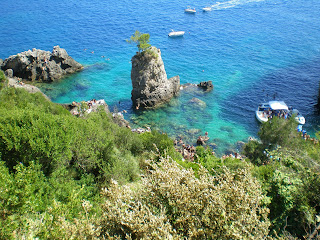
Villa Rosa is a symbolic building of 19th century Corfu. It was started to be constructed in 1864 by Nikos Aspiotis a skilled painter. As he became rich, he started to build the villa on the plot of land he bought. Later he and his family expanded it and it became their permanent home. In 1873, Nikos Aspiotis funded with 7,000 british pounds the business of his son, Gerasimos who founded a small playing card factory. That kind of industry was unique at the time in Greece. The scetches on the cards had been designed by Nikos Aspiotis himself. The business was profitable and in 1901, the year that Gerasimos Aspiotis died, it passed to his sons, Konstantinos and Nikolaos. Konstantinos Aspiotis was a bright and progressive man who until his death, tried to adopt every novelty of his era. He brought to Corfu the first car in 1905 and later on the first radio and two-seating bicycle. He was Corfiot Automobile company manager and he brought Corfu's first bus in 1912. Much later he begun to construct the big printing factory in Avramiou street, in where most of the card postals, greek stamps and lottery coupons had been printed. His wife was Aspasia Marketi, daughter of Nikolaos Marketis who served as a local member of parliament. They had three kids, Amalia, Gerasimos and Mary Aspiotis. The parties given in the villa were big social events, even members of the greek royal family attended them.
In 1997 the property was bought by the greek state. Since then, it is left to its own luck, collapsing day by day. The villa's condition is apalling...the tiles had gone, the basement is flooded and the precious furnitures have been left to rot. In the year 2006, the descentants of the Aspiotis family sued the greek state and demanded that the furnitures should be returned to them. The court denied, claiming that if they do so, those rare pieces will be destroyed. As a result of this decision, all the pieces are gone as they had been stealed.
Below, there are two videos about the property's history (in greek).









































